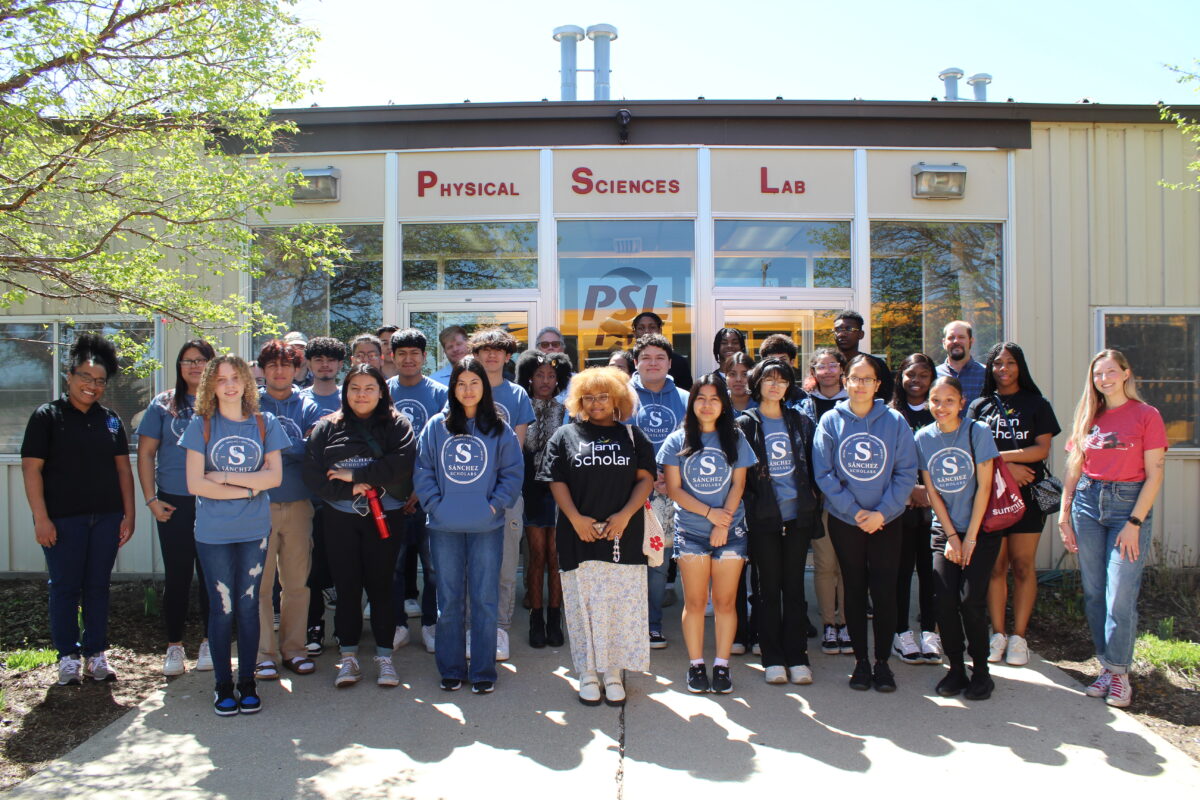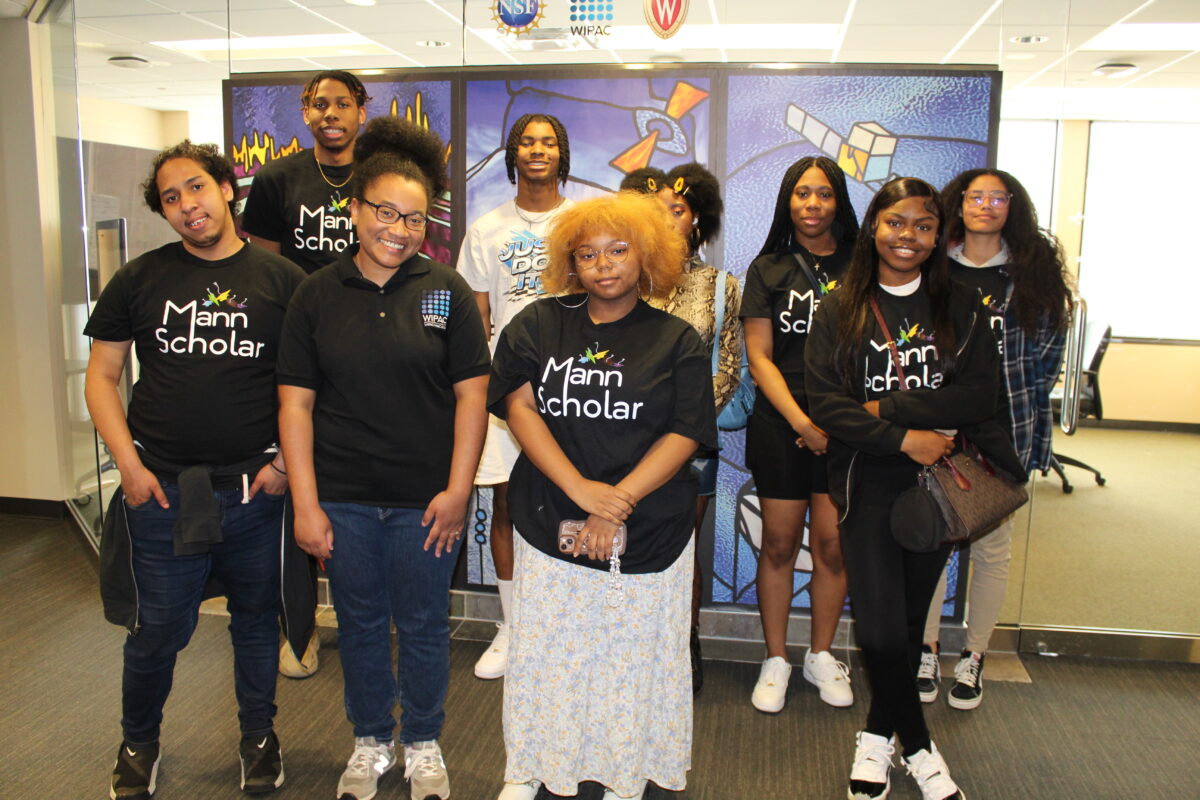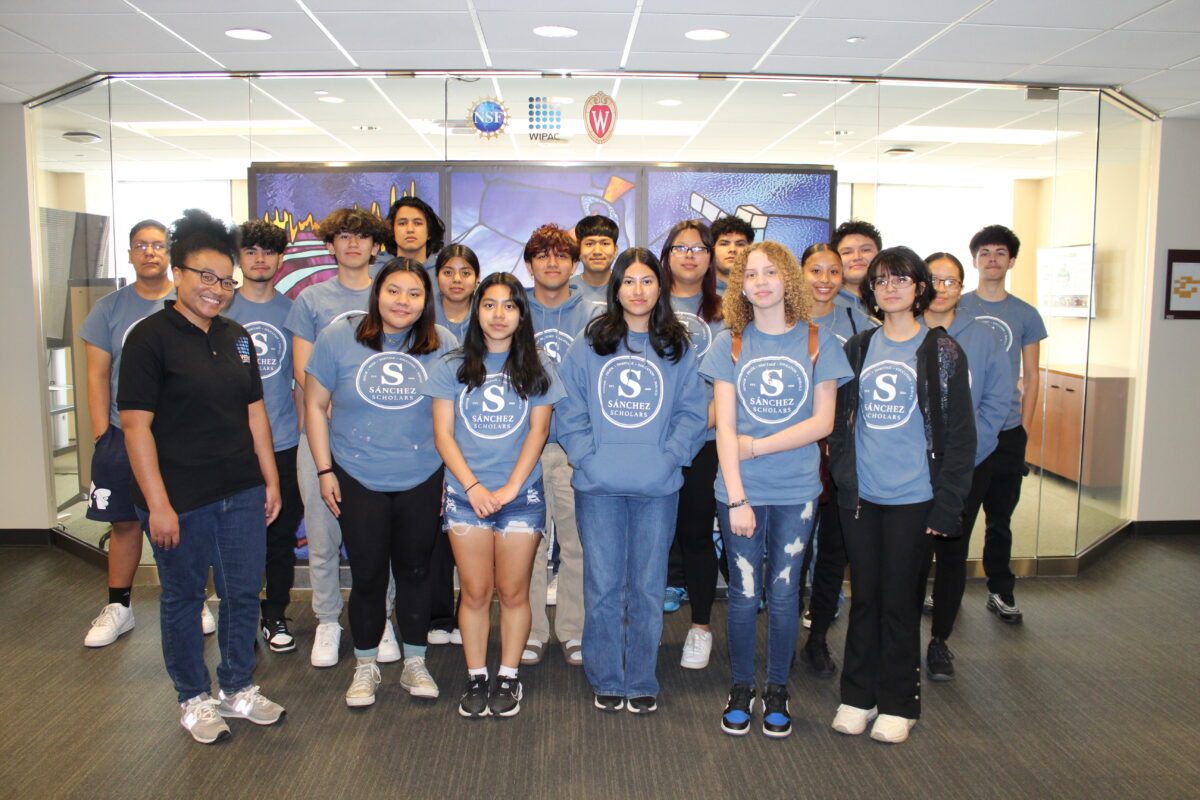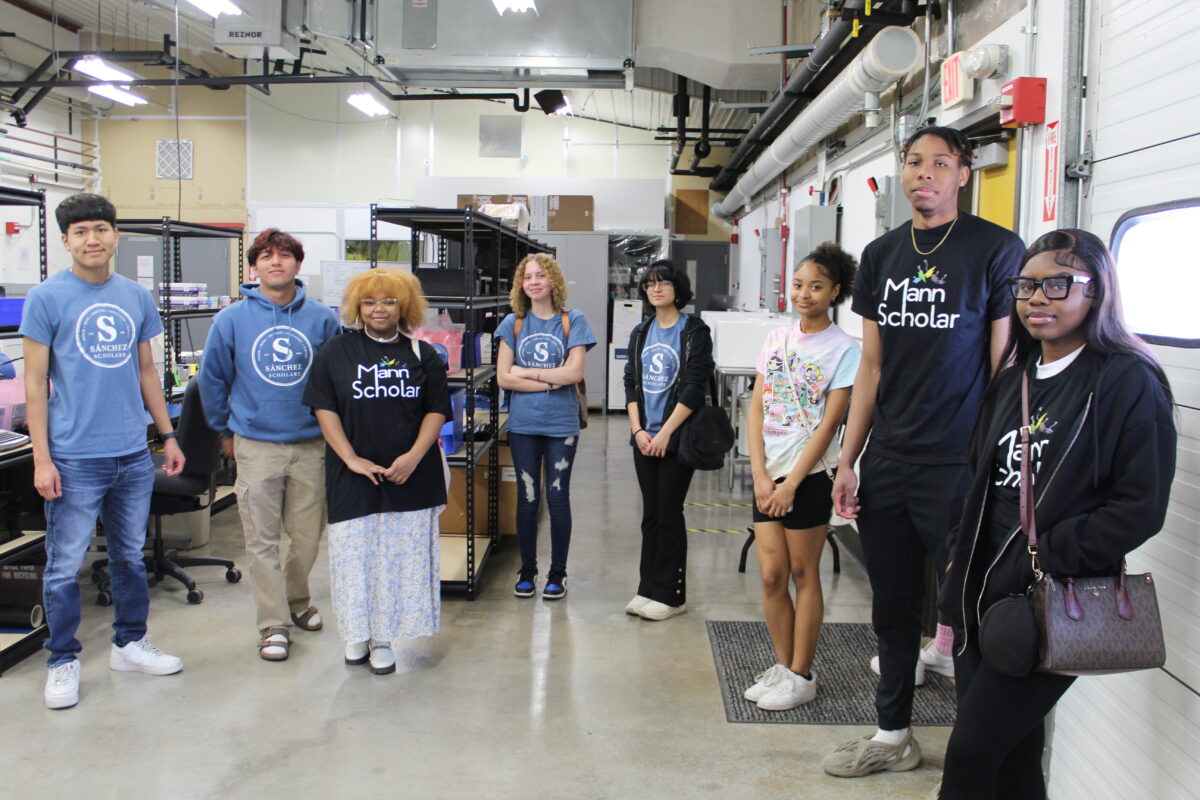This story was originally published by Madison365.

About 30 students from across the Madison Metropolitan School District in the Mann Scholars Program and Sánchez Scholars Program recently toured the Wisconsin IceCube Particle Astrophysics Center (WIPAC), a scientific center for astroparticle research located at the University of Wisconsin—Madison. The day-long field trip was the brainchild of Dr. Alisa King-Klemperer, the communications manager at WIPAC and a former Mann Scholars student.
The special day for the students was funded by a UW 175th grant, King-Klemperer says. As UW–Madison celebrates its 175th birthday, UW Chancellor Jennifer Mnookin and the 175th-anniversary steering committee have been encouraging the entire campus community to participate throughout the year with special events, programs, and initiatives, and anniversary grants. This trip to WIPAC on April 15 was an opportunity for scholars to learn about astrophysics, graduate school and careers in STEM.
“As part of that celebration, there was a call made for proposals to help fund efforts to celebrate 175 years but also to celebrate the Wisconsin Idea. And so, with that, I tried to think about hosting an event at the Wisconsin IceCube Particle Astrophysics Center , which is where I currently work as a communications manager,” King-Klemperer tells Madison365. “I thought it would be great to celebrate the 175 years by giving back to our community by exposing students in underserved backgrounds to career opportunities, but also just exposing them to science, in general.”
The Sánchez Scholars Program provides first-generation Latinx students with tools and resources to boost their academic achievement in high school and to reach their academic dreams. The Mann Scholars Program provides mentoring support and educational tools primarily, but not exclusively, to students of color from the Madison Metropolitan School District who show potential for academic achievement but face significant economic and personal challenges in reaching their full potential.
In 2020, King-Klemperer became the first Mann Scholar ever to get her doctorate. The 2008 Madison West graduate earned her doctorate degree in microbiology from the University of Illinois Urbana-Champaign.

“When I was a Mann Scholar, I didn’t really have the same opportunities and I wish I had those opportunities or insights,” King-Klemperer says about the impetus for creating this field trip for the students. “So when I was organizing this tour, I thought to include the Mann Scholar program, but also the Sanchez Scholars Program because I know those two programs work together very closely.”
King-Klemperer reached out and was able to set up a day when WIPAC could host Mann and Sánchez Scholars and the students could learn about some of the cool science that is happening in their own backyard and how those skills they learn in high school and college will transfer to real-life situations.
WIPAC is a scientific research center within the Office of the Vice Chancellor for Research at the University of Wisconsin–Madison with researchers based in the Departments of Physics and Astronomy. Until December 2011, WIPAC was known as the IceCube Research Center.
“We are a research center on campus and we study gamma rays, cosmic rays, neutrinos, astronomy, and astrophysics,” King-Klemperer says. “We have experiments that are touching on all those research fields. So the biggest experiment at WIPAC is the IceCube Neutrino Observatory, which people know as IceCube, for short, at the South Pole.”
As the host institution of the IceCube Neutrino Observatory – a cubic kilometer neutrino and cosmic ray detector in the South Pole ice – WIPAC is the hub for the international IceCube Collaboration of more than 300 researchers from 58 research universities and laboratories in 14 countries.
Besides a dedication to research in particle astrophysics, WIPAC focuses on developing and producing innovative instrumentation for current and future projects working closely with the University of Wisconsin–Madison Physical Sciences Laboratory on the design and production of electronics and hardware. Located in Stoughton, just outside of Madison, that’s where the day started for the 30 students.
“The Physical Sciences Lab is also part of the university and what they do is actually fabricate a lot of the equipment that gets used in other experiments such as DUNE and WHAM … mostly physics experiments,” King-Klemperer says. “So for example, they are actually fabricating some of the hot water drills that will be sent down to the South Pole next field season to be used for this project called the IceCube Upgrade.”
The students did a tour that started with an introduction and talk given by Terry Benson, the director of UW-Madison’s Physical Sciences Laboratory.
“From there, we were separated into four different groups and we toured four different stations,” King-Klemperer says. “So they got to learn about different projects and see the actual equipment that’s being made.”

At the end of that, the students got to hear from Lexi Oxborough, a mechanical engineer, who talked about her career path including how she became an engineer and what she does at the Physical Sciences Laboratory.
During the second part of the day, the students went to the WIPAC offices located on the fifth floor of 222 West Washington Ave., just off the Capitol Square, and the young people got to hear from people currently at the South Pole.
“There was a live webcast from the South Pole. That was really cool. The students got to learn about what it’s like to be at the South Pole and a little bit about IceCube as well,” says King-Klemperer, who was also able to talk to Sanchez Scholars and Mann Scholars a little bit about her career path — how she went from being in graduate school to getting a PhD in microbiology and then deciding to go into science communications.
“I wanted to inspire the students to always follow their passion and talk to them about how it’s not always clear cut what you want to do,” she says. “But the important thing is to do something that you’re passionate about, and to take advantage of every opportunity. I think that’s the main thing.”
“I also wanted them to know that the programs they are involved in — The Mann Scholars Program and Sanchez Scholar Program — are very special and to take advantage of them,” she adds.

The overall experience for her and the students for the day, King-Klemperer says, was “pretty amazing.”
“They were engaged and were asking a lot of great questions … questions that I wouldn’t think to ask, especially when we were at the Physical Sciences Laboratory. They just were so interested in the physics of everything. And they were able to touch certain things like the equipment and the gadgets, and it was really cool to see their eyes light up and see them smile and laugh. They definitely were very interested.”
King-Klemperer says she is pretty sure most of the students had never heard of IceCube before that day.
“I think it was exciting to learn about some of this cool science and the fact that we have this thing at the South Pole,” she says. “Overall it was also great because some of them don’t know each other, especially between Mann Scholars and Sanchez Scholars — so it was a chance for scholars to meet each other and connect, as well.
“It was a win-win for everybody. Whenever there is an opportunity, I want to give back to the Mann Scholar Program because they gave so much to me. It was a full-circle moment.”
